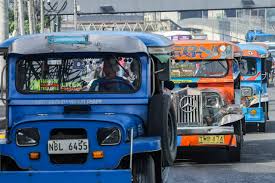The jeepneys that government imposes for its public transport modernization program, from Japan and China, will only further bury the Philippines in debt, while tapping the biggest local manufacturers– which prep their jeeps for the electric vehicle stage can save the government much-needed dollars that it would otherwise buy in repaying for the imported ones.
This finding is based on studies undertaken by independent academic groups following government’s refusal to budge from clamors by unconsolidated jeepney operators and drivers’ groups who have been protesting the modernization program till the end, or until such time that their last hope of obtaining a temporary restraining order from the Supreme Court materializes.
Twenty-two senators in fact have signed a resolution asking the Marcos administration to postpone the modernization program until after a thorough careful study of the PUV Modernization Program is completed.
But President Ferdinand “Bongbong” Marcos, Jr. is adamant, saying that seven extensions to the program’s implementation have already been granted to the protesters, yet they persist in opposing it, Business World reported.
The President said 80 percent of PUV operators have consolidated their franchises under cooperatives or corporations so they can buy new transport vehicles, to which PISTON national president Mody Floranda rebutted that the President did not thoroughly study the Senate resolution and which prompted the group to stage a “unity walk” last August 5 to protest the Senate’s call for a mere postponement.
He urged the SC to fasttrack its decision on PISTON’s petition seeking to stop the modernization program. “The lack of a ruling is causing more confusion. We are still hoping that the Supreme Court will support the situation of the transportation sector.”
Orlando Marquez, Sr., national president of the Liga ng Transportasyon at Operators sa Pilipinas, said there might be kinks in the government’s modernization program, but most drivers and operators have accepted that it is inevitable.
Right to efficient transport
Gina Gatarin, a researcher at the Western Sydney University, said Filipinos have long been denied the right to a comfortable, safe and efficient travel experience.
“But while it has long been overdue to ensure that transport planning and policy- making enable just mobility for most people who rely on public transport, the plans, process and policies for transition must ensure that no one is left behind,” she said.
In a study she did on the modernization plan, she cited the need for “pathways of just transitions” in enforcing the system-wide change.
“Because urban mobility is about human dignity, the government should consider not just the environment and mobility but also labor justice, her study released last April said.
Grassroots organizations have said the government’s anti-poor and profit-oriented program would affect at least 118,000 families and 685 jeepney routes in Metro Manila alone.
The modernization program seeks to establish a state-of-the-art public transport system that induces operators to renew their fleets using higher-capacity vehicles that are also more efficient.
It also lays the groundwork for the electrification of the public transport fleet toward full decarbonization.
“The jeepney sector is highly fragmented and individualized in terms of ownership and operation,” said a JICA study published in 2022, which noted the lack of consolidation that had led to a vehicle-to-franchise ratio of 2.25. About eight of 10 jeepney operators own a single unit.
Under the modernization program, a cooperative must have at least 15 members before it can register with the Office of the Transportation Cooperatives under the Department of Transportation.
Import bias
Elmer Francisco, chairman of Francisco Motors Corp., said a locally-assembled, fully electric modern jeepney would cost P1.99 million, cheaper than the imported units from Japan and China at P2.8 million.
The company had taken 60,000 pre-orders of fully electric jeepneys from all over the country as of June but he cited the slow permitting process to mass produce modern jeepneys.
There also seems to be a bias for established foreign vehicle makers such as those from China and Japan. Local manufacturers like Francisco Motors and Sarao Motors, Inc. can hardly keep up with demand, given their limited production capacities.
“We need the support of our own government because other manufacturers — foreign manufacturers — have the support of their own governments,” Francisco said as he called on the President to support local manufacturers so they can produce electric vehicles.
Francisco said modernization is important to help the environment, make commuting easier and safer for Filipinos and boost the economy.
But most jeepney drivers and operators might be unable to afford the costs of modernization, including joining a cooperative and buying new units, he said.
He blames imported jeepneys that look like minibuses rather than the traditional Filipino jeepneys that are painted with themes including love, sex, religion and family.
His company imports some jeepney parts to assemble the units locally, thus employing thousands of Filipinos.
Retired Prof. Teodoro Mendoza cited two main “blind sides” in the modernization plan — the high price of modern jeepneys and the “domino effect” of possible fare increases to cover the cost of these units. With the peso’s slump against the dollar, high unit prices mean high yearly payments with compounded high interest rates and ultimately, these costs would be passed on fares, thereby raising inflation for food and other commodities.
Mendoza asked the government to subsidize local jeepney makers (instead of pushing for imports). He estimates that it would take 70 years to replace Metro Manila’s jeepneys and 270 for the entire country. Almost P12 billion would be needed to replace 73,000 traditional jeepneys in NCR and P540 billion to replace 300,000 jeepneys nationwide, he said.
Mr. Mendoza said the government should subsidize local modern jeepney manufacturers instead of pushing imports.
#WeTakeAStand #OpinYon #PISTON #PUV #PublicTransportModernizationProgram
